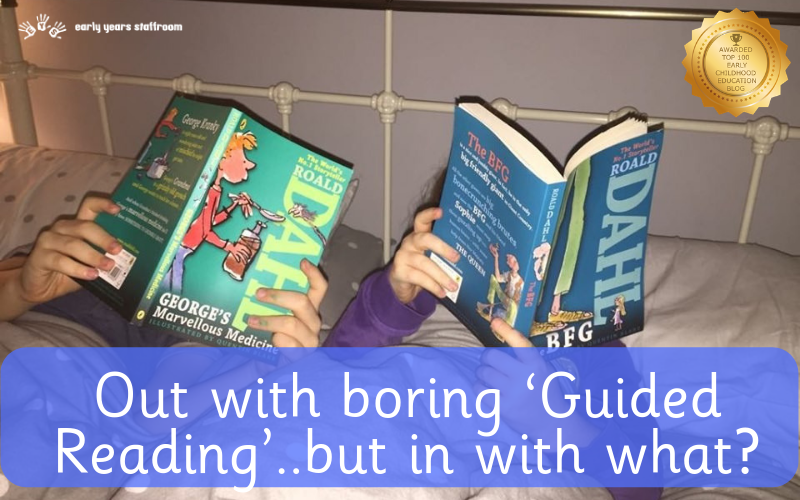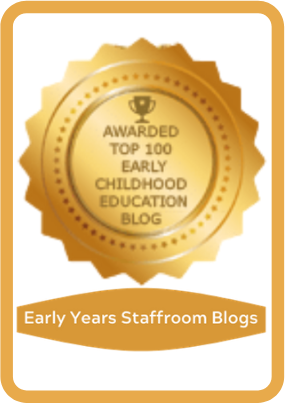Guided Reading Boring ?
Whether we agree or not, the current method for assessing our children’s ability to read and therefore the method to assess a school’s effectiveness at teaching reading is measured by how many words, out of a list of 40 a year 1 children can read. And how well year 2 and year 6 children can write their responses to comprehension questions.
Do we allow our lessons to become as dull as the assessments? Do we only teach phonics and written comprehension skills?
I certainly hope not but I also appreciate that when we are working within a system that measures us in the way that it does, it can be quite tempting. Research shows that without the love for reading children will disengage with the process. We all know how hard it is to teach a child who is disengaged with learning – fighting a losing battle! Without a rich vocabulary and understanding of the English language, our children will not be able to access the texts given to them in the end of key stage tests. Without the ability to verbalise their comprehension of a text their ability to write their responses is weakened.
What can you do to ensure children love reading?
Placing reading at the centre of your classroom; quality texts, modelling your own passion for reading and an environment in which you develop ‘book talk’ will only strengthen your pupils reading outcomes. It may well also have a fabulous impact on your own enjoyment of teaching reading too!
Below are listed elements that are required in order to strike the balance between preparing our children for the assessments they will face and developing them as life-long readers.
Reading areas
You can go all out with these and there are some fantastic examples you can scroll through online. Reading areas can certainly allow teachers the opportunity to create a reading haven in a special space in their classrooms where children can relax and feel comfortable. They don’t have to be extravagant though and we should remind ourselves of why the creative spaces came from as a concept. This is about creating a space in your classroom that shows the children you value reading. It is about developing a space to store good quality texts that your children are enthused to choose from. However you express yourself in your space just focus on what the area is communicating with the children. Is it appealing? Does it value reading? Is it comfortable? We have a great display for your reading area.
Good quality texts
It is crucial that we expose our children to good quality texts that are challenging in content for them so that we can use them as a vehicle to teach the skills of reading. Many schools have reading lists that each year group work through but the most effective lists use challenging texts that hook the children in and challenge their reading ability in both decoding as well as comprehension. Do the children need to read the book themselves? No – this is a great opportunity for adults to model reading to the children and allows for longer texts to be used as the adult will read faster than the children could. Occasionally taking decoding out of the process of teaching reading can be beneficial on many levels – it ensures readers are not disengaged by basic texts and their battle with decoding as well as allowing all children to focus on developing their skills of inference (the trickier of the reading skills for sure!). This is a book of activities to help children learn the skills they need in reading according to the National Curriculum. These can be used flexibly with any text.
Differentiation for a flexible approach
There are a variety of approaches here that centre around the question – do we differentiate the text so children can get a sense of difference and often feel devalued or do we differentiate the questions? A good quality text should allow you to pose questions for all abilities of learners in your class pitched at their starting points. In any setting the key to a good rate of progress in reading is getting the differentiation right. Knowing your children’s starting points, knowing their gaps in understanding and using this knowledge to inform your planning is the simple and most effective way to plan. This will involve using assessment (formative and summative) effectively to inform the direction of your planning. This is where highly structured schemes or approaches can be quite restrictive or then take significant time for teachers to effectively adapt them to suit the needs of their pupils.
Reading for pleasure
It is important that we build time into our timetables for children to simply read. Not practise reading alien words. Not read a text to then answer questions on it. Not read a book because an adult tells them it is a good book. They should just be able to just read. Read a magazine, a comic, a cookbook or a non fiction book that interests them. They should be able to read with a friend or alone. This doesn’t have to be a long slot and doesn’t have to be daily but should be in your timetable so you can model valuing reading, allowing independence and developing realistic habits common in life long readers. Children need to be taught that it is OK not to finish a book they are not enjoying. It is OK to not agree with someone who thinks a book is great. To develop a preference for a certain genre and for this preference to change. Join in with these sessions by reading a book yourself so the children view you as a reader too.
Book Talk
In reality reading as an adult is often a solo activity but pause for a moment and consider why book clubs have become so popular in the last decade. It can’t just be the wine with friends that appeals to so many! Book clubs provide focus and purpose to reading – no one wants to go to the session and not have finished the book.
They allow us to share our opinions and hear the opinions of others on the same topic. Knowing you have read exactly the same content but have taken something different from it is quite amazing to ponder on and without talking about it we would be stuck in our own reading experience of a book.
Book talk in your classroom should be a central part of its very existence. Opportunities to talk about what you have read develop a child’s ability to verbally summarise, re-tell, make links, deduct and infer and many would argue if they can’t do this verbally then they most certainly won’t be able to do this in writing on a SAT’s paper. We have a great handout for parents to use at home.
Ultimately when considering how you teach reading in your classroom, ask yourself these questions:
Do my children know that I love reading?
Do I allow my children to regularly read for pleasure?
Do I expose my children to good quality, challenging texts?
Do I help children choose texts that I know will interest them as an individual?
Do I encourage children to take books home?
Do my children have an opportunity to talk about books?
Do I invite authors into the school for children to meet and be read to?
Do I discuss with parents often what the children are reading?
Do I include books in my role play areas?
Do I use books to find out information?
Is my reading area attractive and comfortable?
Reading Area
We have created questions for the reading area, an ideal reminder for adults.
Maximise reading experiences in your Early Years setting with our progression document for adults to use as a support sheet. This resource highlights skills for each area of the EYFS and provides guidance on how adults can effectively progress children’s development in the reading area.
If you can suggest any resources or planning materials for us to add to the website please send us an email to [email protected]










